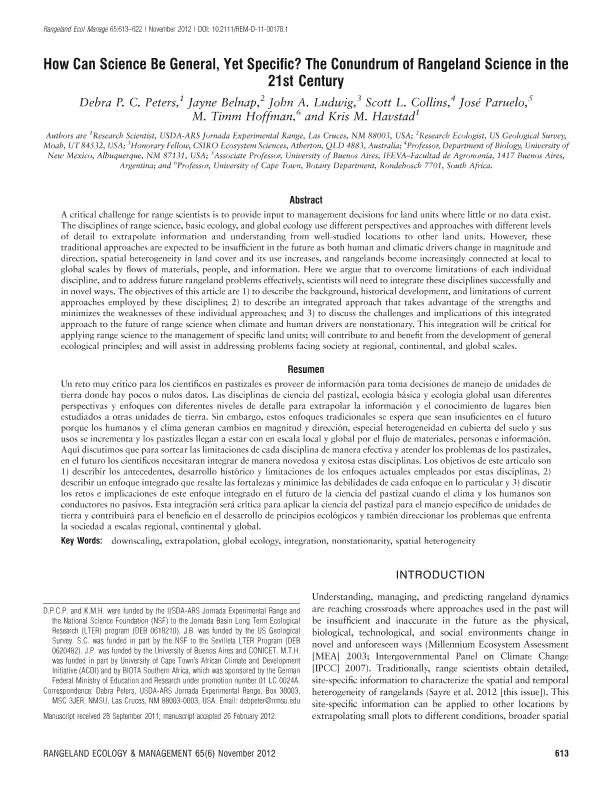Artículo
A critical challenge for range scientists is to provide input to management decisions for land units where little or no data exist. The disciplines of range science, basic ecology, and global ecology use different perspectives and approaches with different levels of detail to extrapolate information and understanding from well-studied locations to other land units. However, these traditional approaches are expected to be insufficient in the future as both human and climatic drivers change in magnitude and direction, spatial heterogeneity in land cover and its use increases, and rangelands become increasingly connected at local to global scales by flows of materials, people, and information. Here we argue that to overcome limitations of each individual discipline, and to address future rangeland problems effectively, scientists will need to integrate these disciplines successfully and in novel ways. The objectives of this article are 1) to describe the background, historical development, and limitations of current approaches employed by these disciplines; 2) to describe an integrated approach that takes advantage of the strengths and minimizes the weaknesses of these individual approaches; and 3) to discuss the challenges and implications of this integrated approach to the future of range science when climate and human drivers are nonstationary. This integration will be critical for applying range science to the management of specific land units; will contribute to and benefit from the development of general ecological principles; and will assist in addressing problems facing society at regional, continental, and global scales. Un reto muy crítico para los científicos en pastizales es proveer de información para toma decisiones de manejo de unidades de tierra donde hay pocos o nulos datos. Las disciplinas de ciencia del pastizal, ecología básica y ecología global usan diferentes perspectivas y enfoques con diferentes niveles de detalle para extrapolar la información y el conocimiento de lugares bien estudiados a otras unidades de tierra. Sin embargo, estos enfoques tradicionales se espera que sean insuficientes en el futuro porque los humanos y el clima generan cambios en magnitud y dirección, especial heterogeneidad en cubierta del suelo y sus usos se incrementa y los pastizales llegan a estar con en escala local y global por el flujo de materiales, personas e información. Aquí discutimos que para sortear las limitaciones de cada disciplina de manera efectiva y atender los problemas de los pastizales, en el futuro los científicos necesitaran integrar de manera novedosa y exitosa estas disciplinas. Los objetivos de este articulo son 1) describir los antecedentes, desarrollo histórico y limitaciones de los enfoques actuales empleados por estas disciplinas, 2) describir un enfoque integrado que resalte las fortalezas y minimice las debilidades de cada enfoque en lo particular y 3) discutir los retos e implicaciones de este enfoque integrado en el futuro de la ciencia del pastizal cuando el clima y los humanos son conductores no pasivos. Esta integración sera crítica para aplicar la ciencia del pastizal para el manejo específico de unidades de tierra y contribuirá para el beneficio en el desarrollo de principios ecológicos y también direccionar los problemas que enfrenta la sociedad a escalas regional, continental y global.
How can science be general, yet specific? The conundrum of rangeland science in the 21st century
Peters, Debra P. C.; Belnap, Jayne; Ludwig, John A.; Collins, Scott L.; Paruelo, José ; Hoffman, M. Timm; Haystad, Kris M.
; Hoffman, M. Timm; Haystad, Kris M.
 ; Hoffman, M. Timm; Haystad, Kris M.
; Hoffman, M. Timm; Haystad, Kris M.
Fecha de publicación:
11/2012
Editorial:
Society For Range Management
Revista:
Rangeland Ecology And Management
ISSN:
1550-7424
Idioma:
Inglés
Tipo de recurso:
Artículo publicado
Clasificación temática:
Resumen
Archivos asociados
Licencia
Identificadores
Colecciones
Articulos(IFEVA)
Articulos de INST.D/INV.FISIOLOGICAS Y ECO.VINCULADAS A L/AGRIC
Articulos de INST.D/INV.FISIOLOGICAS Y ECO.VINCULADAS A L/AGRIC
Citación
Peters, Debra P. C.; Belnap, Jayne; Ludwig, John A.; Collins, Scott L.; Paruelo, José; et al.; How can science be general, yet specific? The conundrum of rangeland science in the 21st century; Society For Range Management; Rangeland Ecology And Management; 65; 6; 11-2012; 613-622
Compartir
Altmétricas



